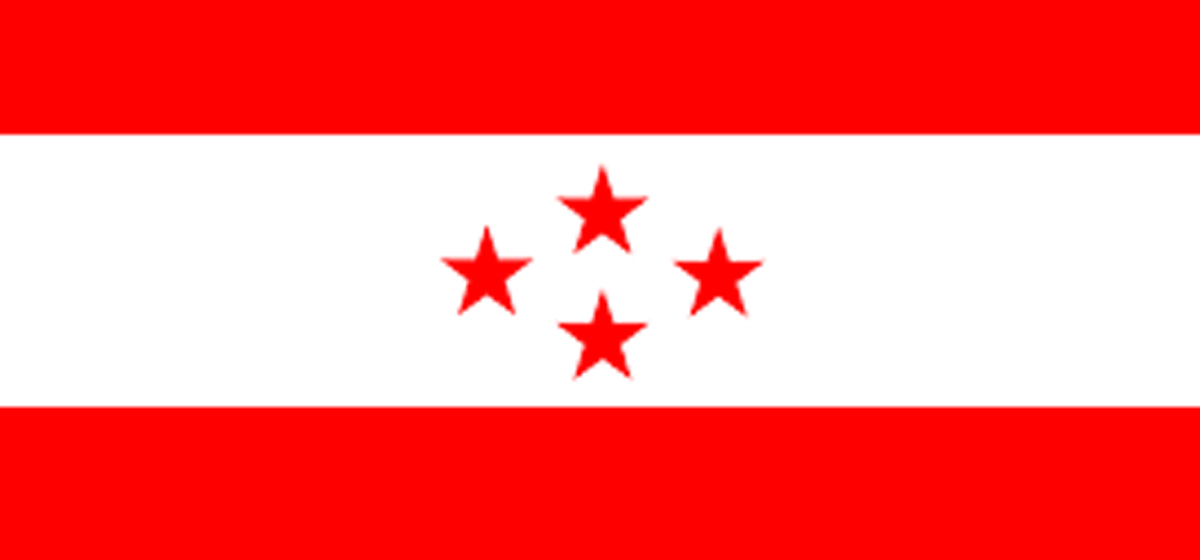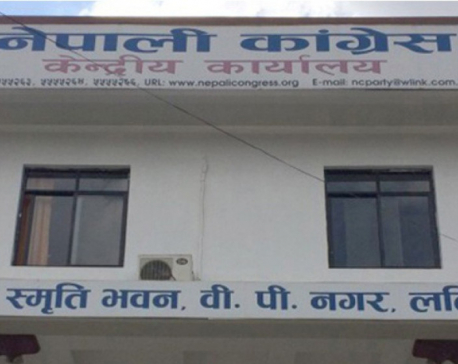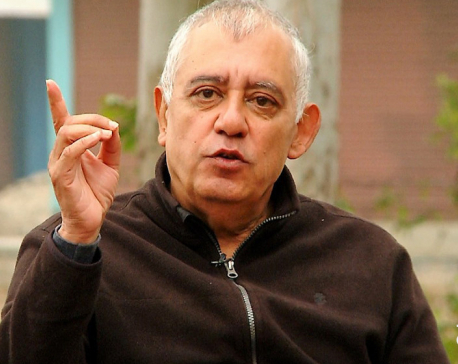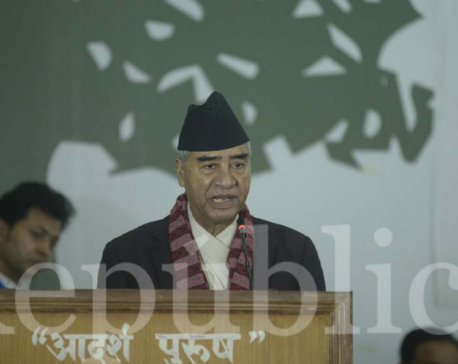
OR
Opinion

There should be a provision for organizing programs to train the party activists and make them efficient regarding the party's principle, ideology, philosophy, policy, and program.
The Nepali Congress (NC) party was founded on April 9, 1950 on the principle of democracy and socialism. The party formally adopted democratic socialism as its principal ideology for socio-economic transformation in 1956. The party has always been in the forefront in all political struggles for the cause of democracy, pluralism, human rights and rule of law, and has played the vital and crucial role for revolution and changes such as the Revolution of 1951 (Revolution of 2007 BS) against the direct rule by the Rana dynasty, People's movement-I of 1990 against absolute monarchy (panchayat system) and People's movement-II of 2006 against the direct and undemocratic rule of the then King Gyanendra Shah. Bringing the Nepal Communist Party (Maoists) into constitutional and peaceful politics through the signing of the Comprehensive Peace Accord, holding Constituent Assembly (CA) elections and promulgating the new constitution through the elected CA are some of the major political initiatives taken by the NC in recent past.
Primarily guided by the thoughts of the late B.P. Koirala, the party has been working for the consolidation and stabilization of democracy and a society based on the value of pluralism. Efforts to institutionalize multi-party parliamentary democracy at the national level and local self-government at community level through elections, declaration of the democratic republic, federalism, proportional inclusion, reservation of underprivileged etc. are some of the political achievements institutionalized at the initiative or leadership of the NC. The new constitution of Nepal was promulgated through the elected Constituent Assembly in September 2015 under the leadership of the NC. The successful completion of elections was the first step toward implementing the constitution effectively. The NC President Sher Bahadur Deuba-led government successfully conducted the local election, which was not held for the past two decades due to the decade-long Maoist conflict and ensuing political transition after 2006, and also the first ever Federal Parliament and Provincial/State Assembly elections. These elections marked the significant step toward institutionalizing democracy and implementing the constitution.
Poll debacle
Despite such a huge contribution to Nepal's democratic struggle, peace and development in the country, the NC could not perform well in the recently held parliamentary and provincial assembly polls. Let alone in other parts of the country, NC could not fare well in its own traditional base i.e. Terai-Madhesh. Out of the total 32 constituencies in the parliamentary election in Province 2, NC could secure victory only in six constituencies. The result in the provincial assembly poll is also similarly dismal. This has made the NC to even lose the status of the main opposition party. Various factors seem to have played a role behind the recent poll debacle.
First, the party failed to have any strong agenda during the election. Surprisingly, the candidates contested the elections with the agenda of their own in the absence of a strong election agenda from the party in order to compete with the Alliance forces. Though there was not much reduction in the percentage of popular votes, the party has a weaker presence in the federal parliament, provincial assemblies and local governments.
Second, the party leadership failed to make judicious selection of election candidates. Factional politics prevailed even while selecting the candidates, ignoring the popularity of candidates at the ground level. Third, there was some weakness on the part of the party leadership to effectively mobilize the party's wings. Fourth, the leadership did not put efforts to identify the rapidly changing expectations of the people, thinking that the NC is the only Democratic Party in the country. As for instance, hardly any youths other than those from the party's wings appear attracted to the NC in Terai-Madhesh. Fifth, non-cooperation within the party owing to factional politics is equally to be blamed for the election defeat.
Sixth, betrayal within the party is also responsible for the loss. It seems to be legalized as it is on an increasing trend and there is no strong disciplinary action taken against the activists who deceive the candidates during the election. Seventh, the party leadership failed to make an effective election strategic plan particularly in mobilizing the resources properly and forming a broader alliance among democratic forces against left parties’ alliance which adversely affected the election results.
Way forward
There is no alternative to the democratic system in today's world. The NC has always been advocating democracy. However, it's challenging to maintain the true spirit of democracy. The party is currently passing through the most difficult situation in history. Certain measures have to be taken into account to get rid of the present crisis and revitalize the NC.
The socioeconomic policy and politics within the democratic framework including the party's principal ideology need to be modified relevantly with time and situation.
The party needs to work being closer to the people's heart. Since change is a universal law, there are changes in the thoughts of the people. The party should be well acquainted with the needs and demands of the people, and make them perceive its activities for their well-being. The party's policy and programs need to be modified as per the changing requirements of society.
There should be a provision for organizing programs to train the party activists and make them efficient regarding the party's principle, ideology, philosophy, policy, and program. Likewise an effective broadcasting mechanism has to be established to strongly broadcast the viewpoint and also the significant achievements during its tenure.
The party organization should be proactive. The leadership from the central to the ward committee level should have the courage to accept the defeat, micro-analyze the resulting situation correctly, acknowledge the fact and be ready for mending the lacking. There should not be hesitation in transferring the responsibility to the right person for the betterment of the party organization.
There has been no attraction among the youths toward the NC in recent years. Youths especially in Terai-Madhesh are attracted towards the FSFN and RJPN rather than the NC. It is, therefore, essential to have special programs to attract and mobilize youths who are the backbone of the nation and a vehicle for change.
The role of the NC party as the main opposition in parliament has to be constructive and watchful for the cause of democracy, nationalism, human rights, rule of law and social welfare.
Conclusion
Victory or defeat in the election is not a big deal. Every party passes through ups and downs in their history. But, it's always wise to find out the absolute reasons for the loss and also to explore the appropriate measures for improvement. The leadership should be highly responsible to make the party activists aware of the situation and not to let them get frustrated, otherwise, there might be a higher probability to move away. To revive the party, it is mandatory to review history, deeply analyze the spirit of democracy and upgrade its newer and fundamental perspective. At the same time, it has to quit irrelevant thoughts and principles. Overhauling the party organization and taking strong action against betrayal is a must.
You May Like This

NC calls Central Working Committee meeting
KATHMANDU, Dec 27: Nepali Congress has called a meeting of the party’s Central Working Committee (CWC) on Friday. ... Read More...

Alliance with CPN-UML likely after MCC is ratified: Shashanka Koirala
KATHMANDU, Feb 25: Nepali Congress (NC) lawmaker Dr Shashanka Koirala has expressed apprehension over the party remaining in the government... Read More...

Certificates distributed to NC’s newly-elected officials and members (With Photos)
KATHMANDU, Dec 25: The newly-elected central members of the Nepali Congress under its 14th General Convention have been given ‘certificates’... Read More...






Just In
- NRB introduces cautiously flexible measures to address ongoing slowdown in various economic sectors
- Forced Covid-19 cremations: is it too late for redemption?
- NRB to provide collateral-free loans to foreign employment seekers
- NEB to publish Grade 12 results next week
- Body handover begins; Relatives remain dissatisfied with insurance, compensation amount
- NC defers its plan to join Koshi govt
- NRB to review microfinance loan interest rate
- 134 dead in floods and landslides since onset of monsoon this year












Leave A Comment